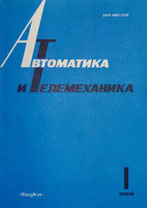|
|
Avtomatika i Telemekhanika, 2018, Issue 3, Pages 21–43
(Mi at14612)
|
 |
|
 |
This article is cited in 13 scientific papers (total in 13 papers)
Nonlinear Systems
Synthesis of state unknown inputs observers for nonlinear Lipschitz systems with uncertain disturbances
A. I. Malikovab
a Tupolev Kazan National Research Technical University, Kazan, Tatarstan, Russia
b Institute of Mechanics and Engineering, Kazan Science Center, Russian Academy of Sciences, Kazan, Tatarstan, Russia
Abstract:
We propose methods to synthesize observers for the state and unknown input influences that ensure that estimation error is finite time bounded with respect to given sets of initial states and admissible trajectories or suppress initial deviations and uncertain bounded in $L_\infty$-norm external disturbances for time-varying continuous Lipschitz systems. Here gain coefficients of the observers depend on time and are determined based on numerical solutions of optimization problems with differential linear matrix inequalities or numerical solutions of the corresponding matrix comparison system. With the example of an electric drive system with elastic transmission of motion we show that their application for state estimation and unknown inputs for time-invariant systems proves to be more efficient (with respect to convergence time and accuracy of the resulting estimates) compared to observers with constant coefficients obtained based on numerical solutions of optimization problems with linear matrix inequalities.
Keywords:
time-varying systems with Lipschitz nonlinearities, unknown input influences, uncertain disturbances, measurement errors, observer synthesis.
Citation:
A. I. Malikov, “Synthesis of state unknown inputs observers for nonlinear Lipschitz systems with uncertain disturbances”, Avtomat. i Telemekh., 2018, no. 3, 21–43; Autom. Remote Control, 79:3 (2018), 406–424
Linking options:
https://www.mathnet.ru/eng/at14612 https://www.mathnet.ru/eng/at/y2018/i3/p21
|

| Statistics & downloads: |
| Abstract page: | 372 | | Full-text PDF : | 70 | | References: | 54 | | First page: | 26 |
|




 Contact us:
Contact us: Terms of Use
Terms of Use
 Registration to the website
Registration to the website Logotypes
Logotypes








 Citation in format
Citation in format 
